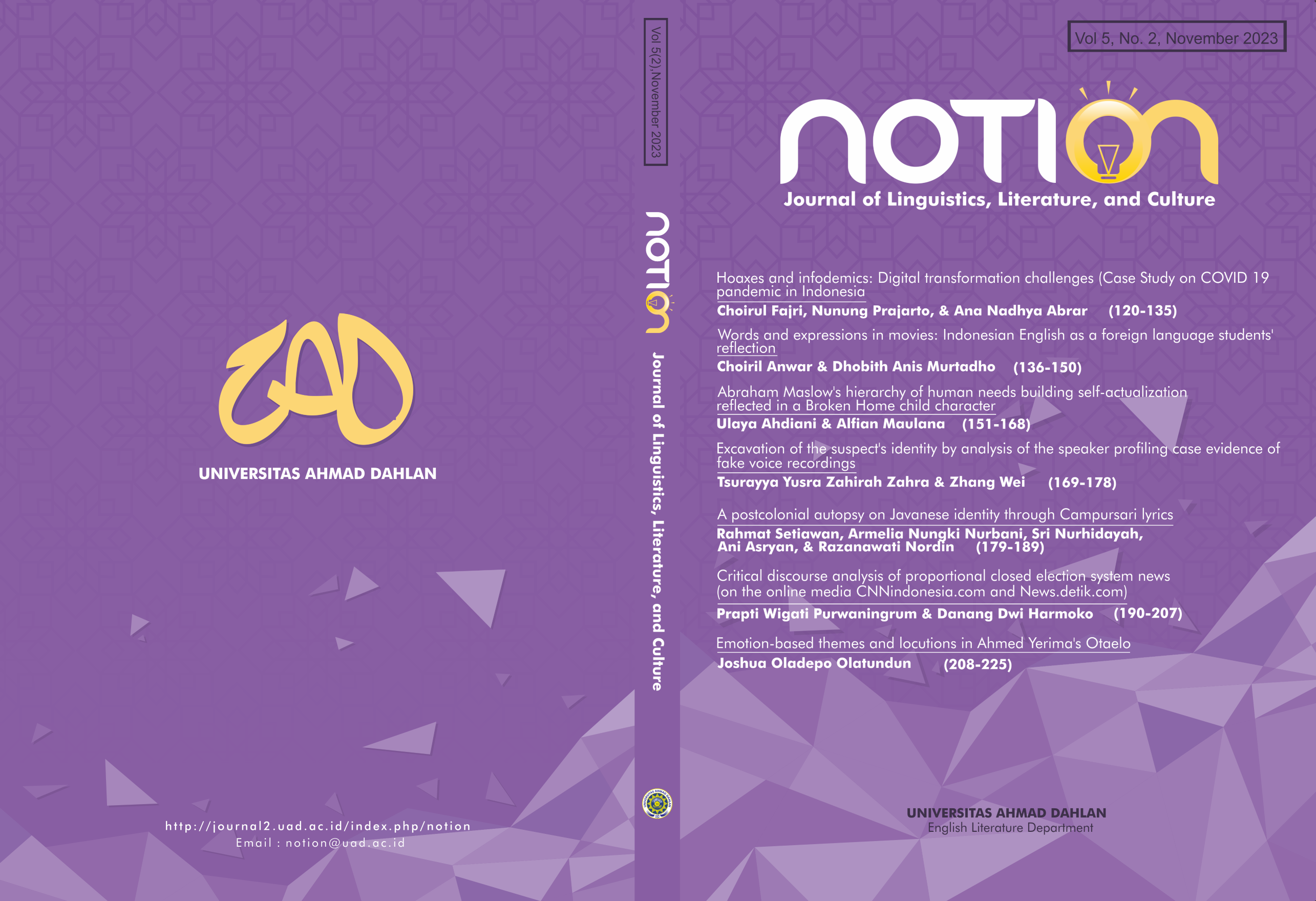Emotion-based themes and locutions in Ahmed Yerima’s Otaelo
DOI:
https://doi.org/10.12928/notion.v5i2.7922Keywords:
Otaelo , Emotion-based theme , Locution , Ahmed YerimaAbstract
This study investigates locutionary indexing of emotion-based themes using Ahmed Yerima’s Otaelo as our selected text. Ahmed Yerima’s Otaelo has a considerable volume of pragmatically salient emotional themes. Aspects of the theories of speech acts, modified Odebunmi’s adapted model of pragmeme and emotionology, considered capable of addressing linguistic forms and functions and expression of emotion were adopted. The findings revealed that themes of emotional satisfaction and perturbation are found in Otaelo. Emotional satisfaction, incorporating love, assurance, appreciation and admiration, are indexed in the text. Emotional perturbation covers fear, anger, rejection, deception, conflict, disparagement and regret. The paper concludes that Ahmed Yerima’s Otaelo thematised emotional satisfaction and perturbation through salient locutions, thereby contributing to the increasing works on pragmatics.
References
Adeniji, A. (2014). Pragmatic acts in selected culture based plays of Ahmed Yerima. Unpublished Ph.D Thesis: Department of English University of Ibadan.
Aladeyomi, S. (2002). An evaluation of the spoken English performance of Nigerian television newscasters. Ph.D Thesis: University of Ibadan.
Amen,V. (1989). Discourse strategies in Okinba Launko’s Minted Coins. M.A Project: University of Ibadan.
Austin, J. (1962). How to do things with words. Oxford University.
Bamberg, M. (1997) The Language of Emotions. In Niemeier, S. and Dirven, R. (eds). Emotion talk(s): the role of perspective in the construction of emotion. John Benjamins
Berg, B. L. (2007). Qualitative Research Methods for the Social Sciences (6th ed). California State University, Long Beach: Pearson.
Brown, A. (2005). Aspects of linguistic style in Chinua Achebe’s A Man of the People. In Atoye, R. (ed). Papers in English and Linguistics (PEL) vol.6.
Catherin, A. (1996). Discourse strategies in Donald Wood’s Biko. M.A Project: University of Ibadan.
Chimombo, M. & Roseberry, R. (1998). The power of discourse: an introduction to discourse analysis. Lawrence Erlbaum Associate.
Esan, O. (2005). Perspectives on Language and Literature. In Olateju, M. and Oyeleye, L. (eds). Aspects of style and meaning in Soyinka’s Kongi’s Harvest: a lexico-semantic approach. Obafemi Awolowo University Press.
Falade, A. (1996). Discourse analysis of William’s The Remain of the Last Emperor. M.A Project: University of Ibadan.
Frazer, B. (1986). Varieties And Functions of English in Nigeria. In Ubahakwe, E.(ed). Context, register and language varieties: a proposed model for discussion of varieties of English in Nigeria. African University Press.
Mey, J. (2001). Pragmatics: an introduction. Blackwell Publishers.
Odebunmi, A. (2006). A pragmatics reading of Ahmed Yerima’s proverbs in Yemoja, Attahiru and Dry Leaves on Ukan Trees. Intercultural Pragmatics 3-2. 153-169. https://doi.org/10.1515/IP.2006.010
Odebunmi, A. (2003). Pragmatic features of English usage in hospital interactions among medical practitioners and patients in South-West Nigeria. Ph.D Thesis. Department of English Obafemi Awolowo University.
Sawyer, N. (2003). Feminist Outlooks at Disney Princess‘s. James Madison University, 3.
Schiffrin, D. (1994). Approaches to discourse. Blackwell.
Silverstein, M. (2004). Cultural concepts and the language–culture nexus. Current Anthropology 45.5: 621-652. https://doi.org/10.1086/423971
Thomas, J. (1995). Meaning in interaction: an introduction to pragmatics. Longman.
Tur, A. P. A. & Sari, F.A. (2019). Reshaping the society face through the culture of horror told in Shirley Jackson’s the lottery. Notion: Journal of Linguistics, Literature, and Culture, Vol. 1 (1), p. 1-7. http://www.journal2.uad.ac.id/index.php/notion/article/download/709/377
Tur, A. P. A. & Putri, S. A. (2020). Codes of teenage characters and mama in their talks portraying the sociolinguistic features. Leksika: Jurnal Bahasa, Sastra dan Pengajarannya Vol 14 (2), p. 46-51. http://www.jurnalnasional.ump.ac.id/index.php/LEKSIKA/article/viewFile/7638/3318
Wierzbicka, A. (1997). The Language of Emotions. In Niemeier, S. and Dirven, R. (eds). A Response to Micheal Bamberg. John Benjamins.
Yerima, A. (2003). Otaelo. Kraft Books Limited.
Yule, G. (1996). Pragmatics. Oxford University Press.
Downloads
Published
Issue
Section
License
Copyright (c) 2023 Joshua Oladepo Olatundun

This work is licensed under a Creative Commons Attribution 4.0 International License.
Authors who publish their articles in NOTION: journal of Linguistics, Literature, and Culture agree to the following terms:
- Authors retain the copyright and grant the journal right of first publication with the work simultaneously licensed under a Creative Commons Attribution 4.0 International License that allows others to share the work with an acknowledgement of the work's authorship and initial publication in this journal.
- Authors are able to enter into separate, additional contractual arrangements for the non-exclusive distribution of the journal's published version of the work (e.g., post it to an institutional repository or publish it in a book), with an acknowledgement of its initial publication in this journal.
- Authors are permitted and encouraged to post their work online (e.g., in institutional repositories or on their website) prior to and during the submission process, as it can lead to productive exchanges, as well as earlier and greater citation of published work.





